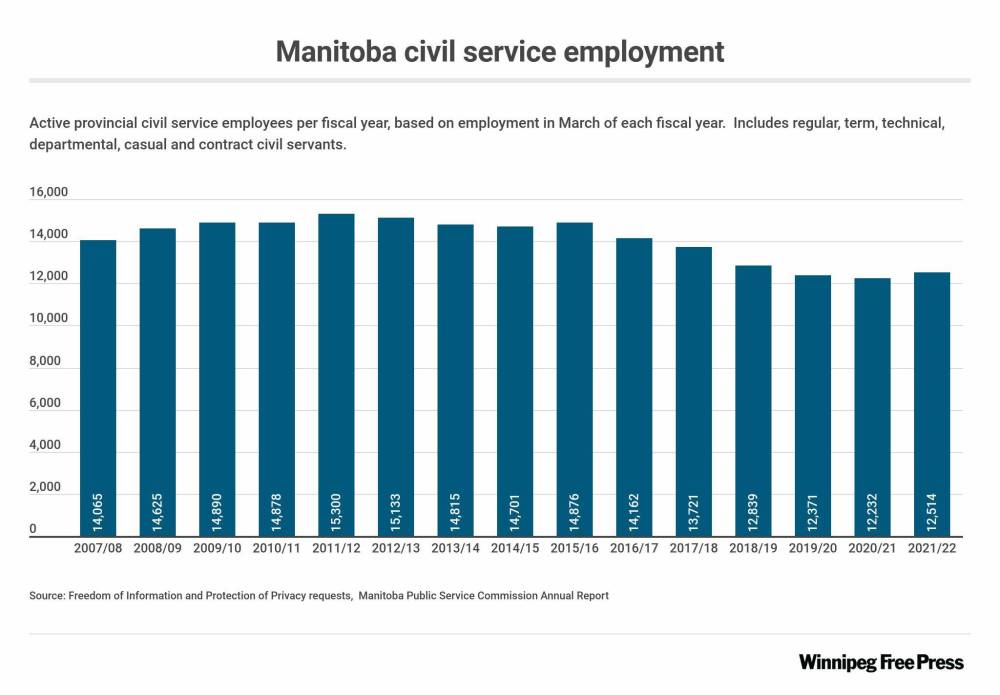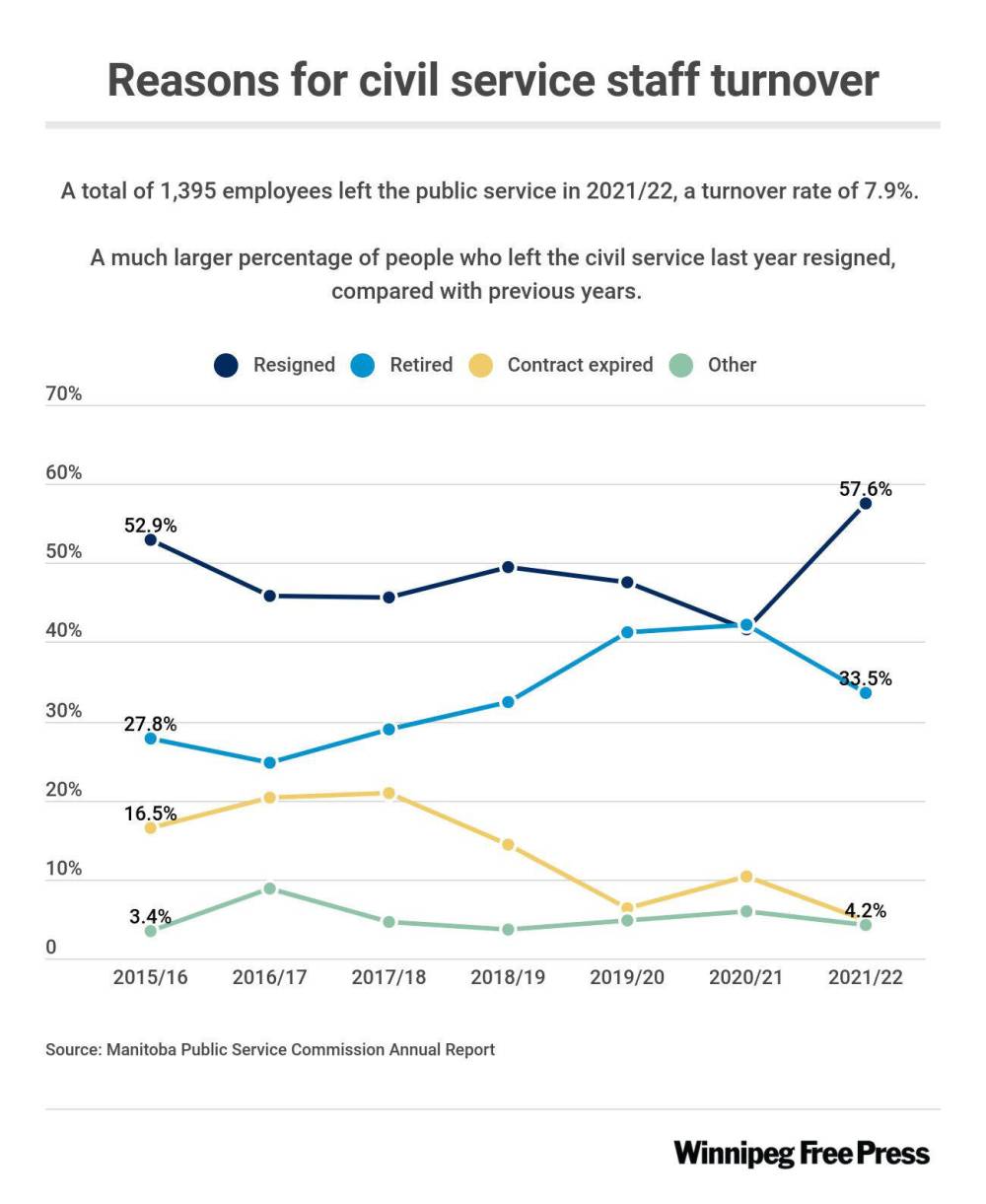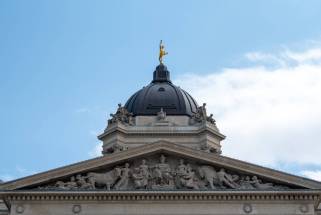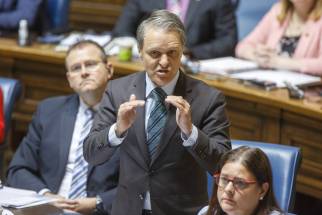Province’s civil service grows for first time in seven years Minuscule increase in new hires still falls short of Manitobans’ needs, union leader says
Read this article for free:
or
Already have an account? Log in here »
To continue reading, please subscribe:
Monthly Digital Subscription
$0 for the first 4 weeks*
- Enjoy unlimited reading on winnipegfreepress.com
- Read the E-Edition, our digital replica newspaper
- Access News Break, our award-winning app
- Play interactive puzzles
*No charge for 4 weeks then price increases to the regular rate of $19.00 plus GST every four weeks. Offer available to new and qualified returning subscribers only. Cancel any time.
Monthly Digital Subscription
$4.75/week*
- Enjoy unlimited reading on winnipegfreepress.com
- Read the E-Edition, our digital replica newspaper
- Access News Break, our award-winning app
- Play interactive puzzles
*Billed as $19 plus GST every four weeks. Cancel any time.
To continue reading, please subscribe:
Add Free Press access to your Brandon Sun subscription for only an additional
$1 for the first 4 weeks*
*Your next subscription payment will increase by $1.00 and you will be charged $16.99 plus GST for four weeks. After four weeks, your payment will increase to $23.99 plus GST every four weeks.
Read unlimited articles for free today:
or
Already have an account? Log in here »
Hey there, time traveller!
This article was published 05/10/2022 (1158 days ago), so information in it may no longer be current.
For the first time since Manitobans elected a Tory premier who made good on a promise to slash the civil service, the number of government employees increased last year, documents released last week show.
After a steady annual decline, in 2022 the number of civil servants increased by 282 positions to 12,514, a two per cent increase from the previous year, and the first growth in seven years.
When the Progressive Conservatives formed government in 2016, then-premier Brian Pallister vowed to balance the budget and reduce the size of Manitoba’s civil service, which then numbered 14,876. It decreased each consecutive year until there were 12,232 in 2021 — a reduction of 2,644 positions (nearly 18 per cent).
The news is small comfort to a smaller workforce that’s been given more duties, says the Manitoba Government and General Employees’ Union.
“This new information shows that they have added back just one job for every ten civil service jobs they cut,” union president Kyle Ross said Wednesday in an email.
JESSICA LEE / WINNIPEG FREE PRESS FILES 'This new information shows that they have added back just one job for every ten civil service jobs they cut,' says Kyle Ross, president of the Manitoba Government and General Employees Union.
“While it is welcome news that the bleeding has stopped, the small number of new hires falls well below what is needed to ensure quality provincial services for Manitoba’s growing population.”
In 2015, Manitoba had a population of 1.29 million and one civil servant for every 86 residents. The population has grown to 1.39 this year, and the ratio is now one provincial employee for every 111 Manitobans.
“The government’s ‘do more with less’ approach has resulted in longer service wait times for Manitobans, deteriorating infrastructure, and burned-out civil service staff,” said Ross, whose union represents nearly 11,000 members in the civil service, including those who work in corrections, highways, conservation and child and family services.
Labour Minister Reg Helwer, who is responsible for the public service, did not respond to a request for comment Wednesday.
Of the 1,395 employees who left the public service in 2021-22, 57.6 per cent resigned and 33.5 per cent retired, the 2021-22 Manitoba Public Service Commission report shows.
A decade earlier, 48 per cent of those who left resigned and 24 per cent retired, the 2011-12 report said.
The latest report shows employee turnover decreased slightly to 7.9 per cent in 2022 from 8.1 per cent in 2021. Civil servants were waiting a bit longer to retire — at 60.9 years of age compared to 60.7 a year earlier. Fifteen years ago, the average age of retirement was 63.
With an aging Manitoba government workforce and nearly 54 per cent eligible to retire within the decade, more than a two per cent per year increase in new hires will be needed to maintain the status quo.
Most senior managers with institutional knowledge, skills and experience may head out the door within the decade.
The latest report says the public service could lose 74 per cent of its senior managers to retirement within 10 years, and 47 per cent could retire within five.
“With many more retirements on the horizon, the provincial government needs to invest in public services and the civil service workers who make them happen,” said Ross. “Let’s hope this is a turning point and the province moves to fill the many jobs needed to properly staff the public services Manitobans count on.”
The provincial government has no intention of properly staffing services, said NDP finance critic Mark Wasyliw.
“This is privatization by design by the Conservatives,” he said Wednesday.
“You basically cut so that these government agencies can’t function. They lose their experience, they lose their expertise and then you turn around and say, ‘Well, we have to hire from the private sector because we have no one around here who can actually do the work.’”
KEVIN KING / POOL /p>
The PC government has no intention of properly staffing services, said NDP finance critic Mark Wasyliw.
An NDP government would rebuild the public service, Wasyliw said.
“This is not going to be easy. This is going to take years to repair the damage,” the member for Fort Garry said.
A major recruitment effort is needed from within and outside the province, as well as an effort to convince retirees to come back when they see that the Manitoba government is serious about building a professional civil service, he said.
“This isn’t an option — this has to get done,” he said. “We saw what happened in COVID; lives were lost in Manitoba because we didn’t have the capacity as a province to respond.”
carol.sanders@freepress.mb.ca

Our newsroom depends on a growing audience of readers to power our journalism. If you are not a paid reader, please consider becoming a subscriber.
Our newsroom depends on its audience of readers to power our journalism. Thank you for your support.
History
Updated on Wednesday, October 5, 2022 10:39 PM CDT: Changes background and featured images







